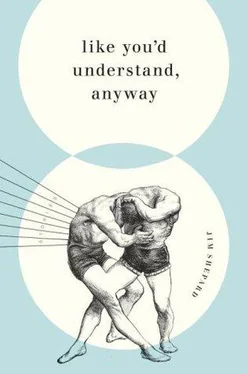“Eros 7, Vostok 5,” Solovyova whispered to me in response, as though relating a football score.
15 June 1963 Morning
The mission calls for the use of a three-stage R-7 rocket that can lift a mass of 4.6 tons into a circular orbit at 155 miles altitude, though my altitude will probably be slightly less. The descent and instrument modules together are only 4.4 meters long; the little sphere of the descent module, only 2.3 meters in diameter, its size limited by the available volume inside the launch shroud. Two minutes into my flight, the strap-on boosters will shut down and separate by the firing of their explosive bolts. The nose shroud will open a minute later, exposing the Vostok. The second stage will continue to burn until it too is depleted and falls away. Then the third will do the same until I've achieved orbit. The spherical shape of the descent module, chosen for its stability, has its center of mass aft so that, protected by its ablative coating, it will assume the correct orientation during reentry, descending along a ballistic trajectory. “In other words, like a bullet, with no attitude control,” Solovyova clarified during one of our classroom sessions. Another of those indiscretions that probably counted so decisively against her.
Soft-landing such a mass would have required an enormous parachute and retro-rocket system — a problem considered too time-consuming, given the race with the Americans — so the designers settled on an ejection system initiated by inertial and barometric sensors. Before Gagarin, no one had ever ejected at that altitude or speed. In the event of a trajectory deviation, the ejection could be activated sooner, though no one knew what the result would be. Sputnik 3 with its two dogs reentered the atmosphere after retrofire at an incorrect angle and burned up. The audio monitors recorded the dogs' cries before the transmission went to static.
We've had to ignore whispers of other disasters, some of them enormous. Bondarenko burned alive in the isolation chamber. A premature ignition of the R-7 that annihilated the launch gantry. Even we knew that mostly what our rockets did, in the early days, was blow up.
So you see, Diary: lovesickness has crowded none of the responsibilities, or apprehensions, from my mind.
15 June 1963 Afternoon
A practice press conference. We're told we both gave incorrect answers about our appetite. Earlier we observed Bykovsky via television. He made no motion while sleeping. “Look at him,” I murmured, and even Solovyova was alarmed by my tone. She said all she could make out was his helmet.
Apparently there'd been consternation that they'd kept from us: on orbit 23 he was to communicate with Earth, but no transmissions were received. The Central Committee had been frantic. When he finally did respond, they asked why he'd been silent. He told them he'd had nothing to say. They're still angry.
During our last private moment together I reminded him that when we returned a new life would begin for us, as celebrities and representatives of the Soviet system. His mind was on his launch vehicle. He handled my arms like they were attitude control handgrips. Gagarin and Titov, I told him, dreaming, had been such big stars, afterward; they'd done whatever they dared. We were in a maintenance room of an electrical substation in the basement of the gantry supports. There was nowhere to sit. He entered each of our kisses dutifully, but gave himself over to them once they were initiated. I felt a wash of sadness each time. “Do you want to touch me?” I asked him. “I am touching you,” he told me. But then we heard the heavy jingling of wrenches on someone's utility belt down the hall, and we were out of time.
15 June 1963 Afternoon
That first night when the male and female candidates were brought together, I just stood there with my eyes closed, immersed in the different voices. Ponomaryova, an engineer and city girl with some of the starved attractiveness of the old cinema stars, carried on about how much she admired the children of peasants, who got by without adults, the adults laboring in the fields all day while the children became the emperors and explorers of their own world.
I fit in poorly from the very beginning. “Let's go to the cinema!” the other women would say when we had a free moment. “I can't,” I'd tell them. But I wanted to so much I could have cried. Why did I do such things? It was hard to watch how much less they came to like me than each other. They were the sort of people who always had stories to tell because something was always happening to them. They looked at me like I was a horse in a stall. Soon we became so petty we stopped handing each other cups during afternoon tea.
And even so, Solovyova had befriended me. We'd taken walks. We found an overgrown pond we christened the Night Witches' Hideout.
But during the mixed gatherings we were more diffident, and I gravitated to Bykovsky He'd traveled on foreign expeditions and told stories about tropical forests and typhoons. We took our own walks around the grounds. “Did they tell you about city boys, down on the farm?” Ponomaryova asked one night as we lay in our bunks. Solovyova was turned to the wall. The other women simpered. I answered with a joke, telling myself my conscience was clear. But the truth was that a new reality was coming into being for me. Waking up each morning I felt an astonishing absence of emptiness, something I hadn't gotten used to. He was becoming a pressing concern, always present somewhere. Early one morning I gazed at Solovyova's sleeping hand trailing on the floor like a vine and remembered him remarking that he loved my dozing because it seemed such a self- aware form of sleep. And I thought I had to have this love so I'd no longer be so endlessly alone. I could feel it making me new.
After Gagarin's flight, the Kremlin had been flooded with letters from women asking to be considered for spaceflight. Soviet women believed they belonged with men in this greatest of all adventures. Because of the ejection requirements, only those who belonged to parachute clubs were part of the initial selection, after which there was further screening for medical fitness, age, size, and weight. Interviews then took that pool from fifty-eight to five. Those who flew would become heroes. Those who didn't would remain unknown.
We were told to inform our families that we'd been selected for a special parachuting team. We were tested for exposure to vibration, noise, pressure, extremes of temperature, and long-term isolation. Various tests exposed various weaknesses. Yerkina was eliminated during an isolation test when she removed her boots and ate only two helpings of rations in three days. Ponomaryova, who'd been so pleased to be the only pilot and engineer, reacted badly to the centrifuge. She complained afterward that we might as well have passenger cosmonauts, since the individual was the insignificant recipient of the collective's work. Sour grapes. I did everything that was asked of me, keeping an eye on Bykovsky advancing through the men's ranks beside me. “Look at the level of your absorption!” Solovyova exclaimed at one point. “It's like a warped version of intellectual activity.” I tried to emulate the way he applied his mind to his business, refusing to dwell on the relentless instants that were bearing everything away. Separations were like return visits from nearby desolation, the way my father's death would come to me some minutes after I awoke, even years after it happened. Was something good or bad news? It began to depend on how it influenced my seeing Bykovsky.
“You know, soon we'll never see one another again,” Solovyova said from the bathroom, apropos of my distress. She pointed out that our menstrual cycles had fallen into synchrony, which happened at times when women lived together. I told her that I felt ready to accept whatever lay ahead. She threw up her hands and left the room.
Читать дальше












